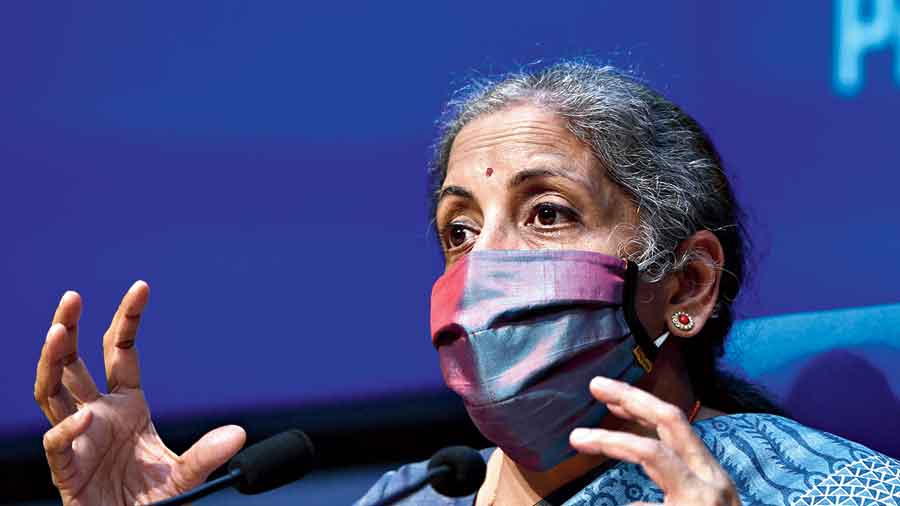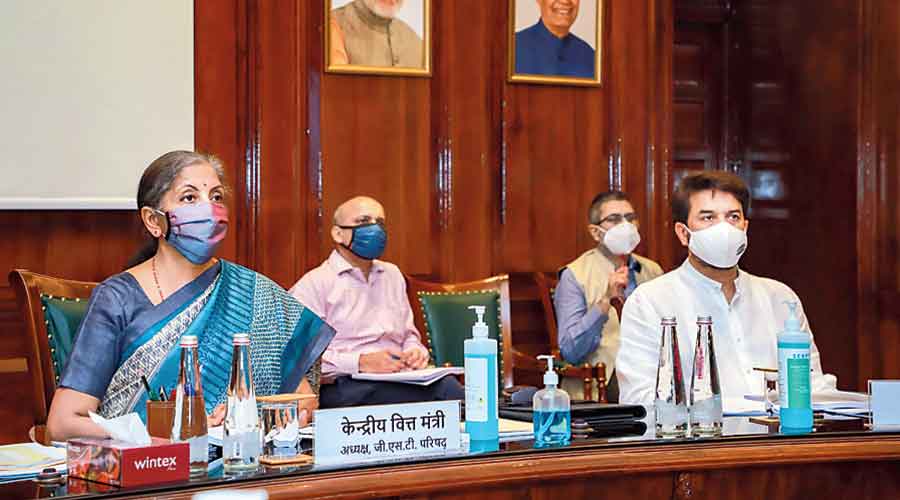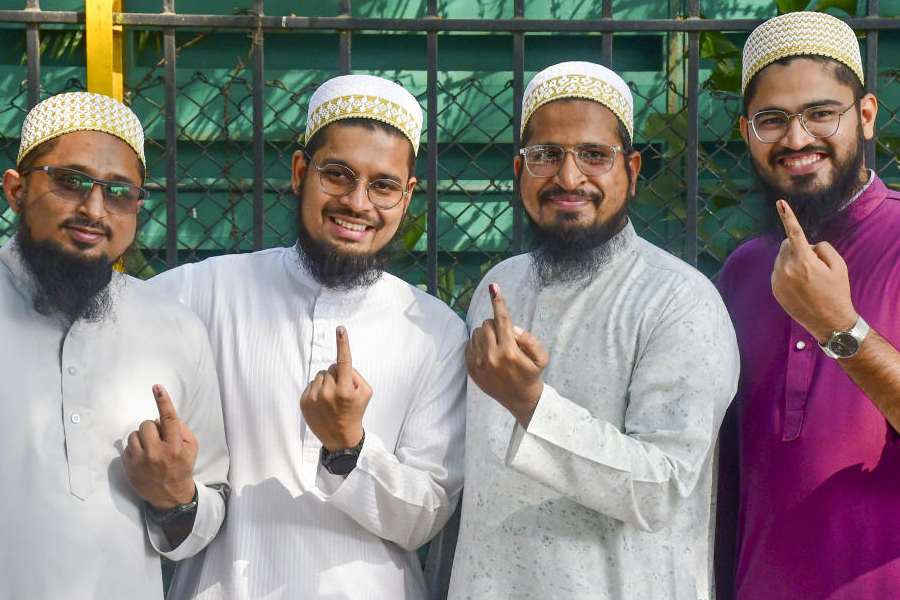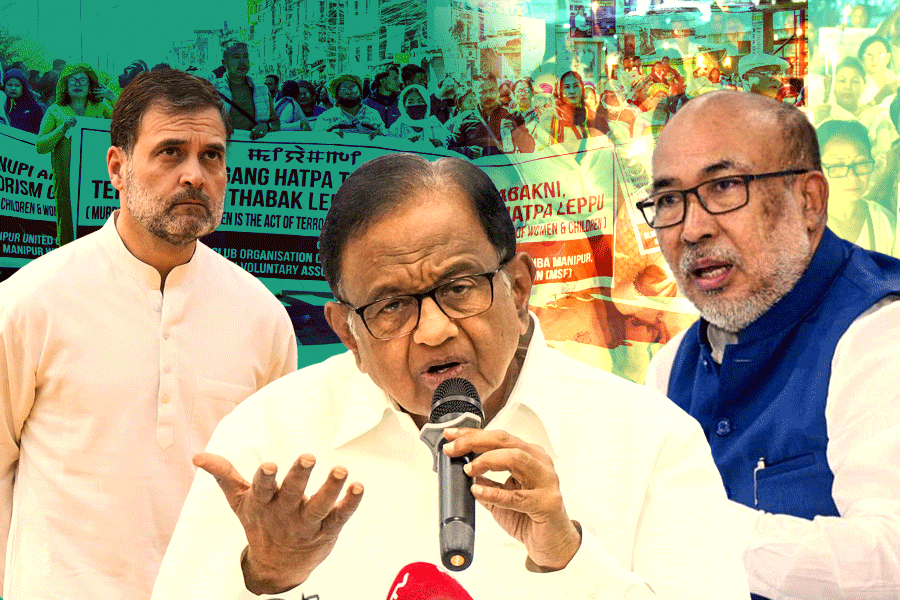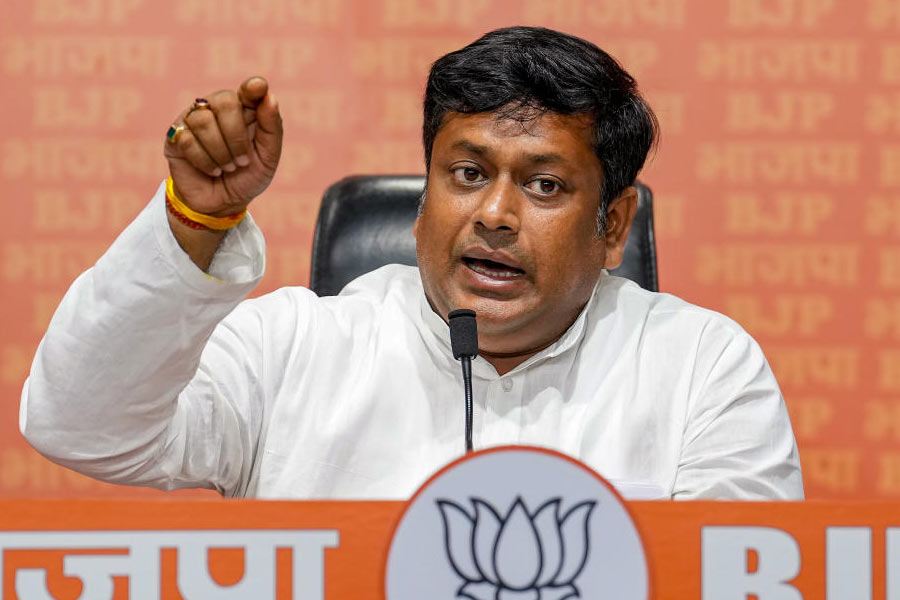The Narendra Modi government had to eat humble pie on Monday when it was forced to back down on its contentious plan to deny states a payout of the Rs 1.38 lakh crore arising from the anticipated shortfall in goods and services tax (GST) collections this year.
The sudden volte-face came during a stormy, eight-hour meeting of the GST Council where Opposition-ruled states, including Bengal, Kerala and Punjab, challenged the Centre’s despotic stand in disclaiming its constitutional obligation to fully compensate the states for any shortfall in tax collections this year.
The Centre was also forced to concede the states’ demand that the compensation cess, which is levied on luxury goods like cars and tobacco products,should be extended beyond 2022.
The cess will be used to cover the shortfall that the Centre had attributed to the outbreak of Covid-19 --- and which it had initially argued it was not obliged to compensate under the law.
There was near-chaos late in the evening when finance secretary Ajay Bhushan Pandey abruptly called an end to the daylong, clamorous discussion, with several states furious that a mere bureaucrat had usurped the right to terminate a Centre-states meeting when the finance minister — the chairperson of the council — was present.
A source quoted Pandey, who is also the revenue secretary, as saying: “The meeting is closed. The department of economic affairs has assured that it would help the states to borrow. The meeting is closed.”
“Such an incident has never happened in the last 41 meetings of the council. There are CMs and finance ministers and the meeting was closed abruptly,” said a furious participant at the meeting.
On August 29, the Modi government had estimated the overall shortfall in GST collections this year at Rs 3 lakh crore. It feared a yawning gap of Rs 2.35 lakh crore as the compensation cess that is levied on a small group of luxury goods like cars and tobacco would yield only Rs 65,000 crore this year.
The Centre had arbitrarily attributed a sum of Rs 1.38 lakh crore to Covid-related causes and disclaimed its responsibility to fork out the sum since it was not covered by the GST legislation.
The Modi government had offered two choices to the states: borrow a sum of Rs 97,000 crore from a cheap loan window that the Reserve Bank of India would open for them, or raise the entire sum of Rs 2.35 lakh crore in the form of loans at market rates.
Sitharaman told reporters that 21 of 30 states and Union Territories had accepted the first option -- a claim later contested by the state finance ministers who had attended the meeting. They said Andhra and Puducherry had not opted to borrow on their account and had instead asked the Centre to borrow the sum and pass it on to the states.
Pandey’s abrupt move to end the meeting threw the entire meeting into disarray. “This meant that the states would have no choice but to accept Option 1: that is, borrow a sum of Rs 97,000 crore on their account,” a source said.
The Opposition-ruled states immediately sought a vote and said the outcome would then be binding on all. “(They said) let this be a decision of the GST Council. At least two states, Puducherry and Andhra Pradesh, who were said to be siding with the Centre and were rooting for Option 1, immediately turned around and said they wanted the Centre to borrow instead,” the source said.
The vote was not eventually held -- presumably because the Centre was no longer confident of the result.
Sensing trouble, Sitharaman immediately struck a conciliatory stand and said she wanted to build consensus on the controversial issue of GST compensation. She offered to schedule another meeting on October 12 where the differences would be ironed out.
The finance minister looked upset at her virtual media conference, held after the meeting, as it became obvious that the Modi government had come away with egg on its face after being forced to concede the states’ demand to extend the term of the compensation cess beyond 2022.
“The GST council has approved to extend the cess (surcharge) beyond five years,” the finance minister said in her opening remarks at the media conference.
The surcharge on luxury goods such as cars and tobacco products, which varies from 12 per cent to 200 per cent, is part of the national goods and services tax (GST) introduced in 2017, and was due to expire in 2022.
Peace initiative
In another effort to appease the Opposition-ruled states, Sitharaman said the shortfall of Rs 97,000 crore that had been attributed to GST implementation — and, therefore, covered by the constitutionally backed compensation obligation — would be raised to Rs 1.10 lakh crore.
For the first time, she explained how the Centre had arrived at the sum. Under the law, the states have been promised an annual increment of 14 per cent in GST revenues for the first five years. Any shortfall has to be compensated by the Centre through the surcharge on luxury goods.
The Centre had initially estimated the base revenue growth this year at 10 per cent instead of the promised 14 per cent. The figure of Rs 97,000 crore was calculated on the basis of this gap between promise and achievement.
The states have argued that this calculation was flawed -- and insisted that the gap should be calculated on the basis of a 7 per cent anticipated increase in revenue this year. The Centre buckled before the pressure and, therefore, raised this sum to Rs 1.10 lakh crore.
A perturbed Sitharaman said: “There are some states which have not chosen any (borrowing) option and the suggestion was that the Centre should borrow. On this, there was a lot of discussion. Coming almost to the end of the day, it was felt that you cannot really decide on the basis of 21 states who have written to you and that we need to talk further.”
“I was also gently reminded that I cannot take anybody for granted,” she added. “I do not take anybody for granted; I said this there and I am saying it here. And, I have always been open for more and more talks.”
Thomas Isaac, finance minister of Kerala, tweeted after the marathon meeting that “10 states demand that full compensation should be paid to the states during the current year as per clauses in the law and centre should borrow. Decision was postponed to the next meeting on 12th of October.”
The 10 states are Bengal, Kerala, Punjab, Delhi, Jharkhand, Chhattisgarh, Telangana, Andhra, Rajasthan and Puducherry.

